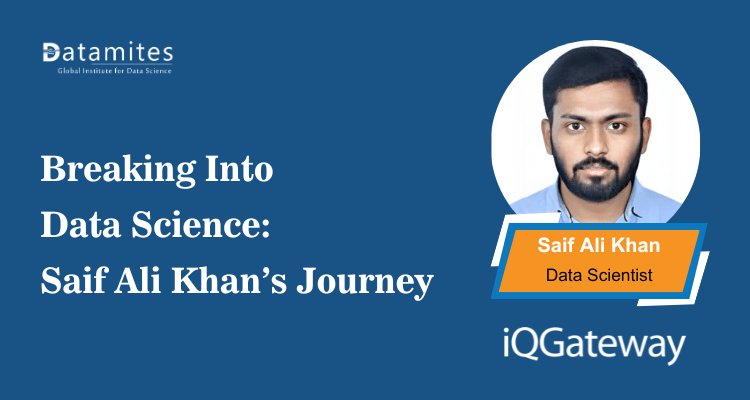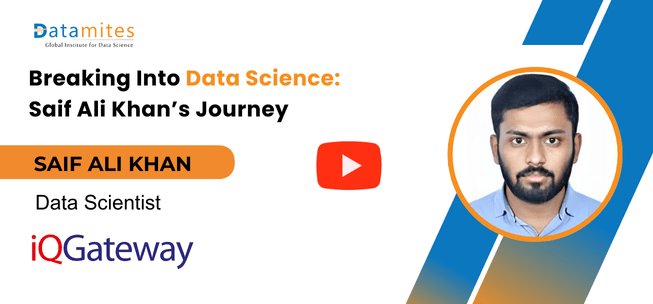Breaking Into Data Science: Saif Ali Khan’s Journey
Saif Ali Khan shares how he transitioned into data science, from early challenges to landing his first role. His story offers practical steps and lessons for anyone aiming to make the same leap.

Breaking into data science can seem daunting, especially for freshers without prior industry exposure. Saif Ali Khan’s journey proves it’s achievable with the right training, structured learning, and a strong focus on the fundamentals. From enrolling in the Certified Data Scientist course at DataMites to securing his position as an Associate Data Scientist, Saif built his career through hands-on projects, deep technical learning, and consistent practice. His story reflects the growing opportunities in data science for those willing to put in the effort.
In this conversation, Saif shares the skills that helped him stand out, the tools he uses in his role, his approach to interview preparation, and his insights on trends like prompt engineering and agentic AI. His experience is both inspiring and practical for anyone aiming to enter the field. Watch DataMites success stories to see how learners from diverse backgrounds are transforming their careers in this fast-evolving domain.
How Saif Ali Khan Launched His Data Science Career with DataMites
Here’s how a fresher with no prior work experience built the skills, projects, and confidence to land a data scientist role through focused training and guidance.
Q1: When did you join the DataMites Certified Data Scientist course, and where are you working now?
I joined the course in July 2023 and started working as an Associate Data Scientist in July 2024. It’s been a year of learning and growth, from orientation and coursework to internships and finally landing my role.
Q2: How was your overall experience with DataMites?
The journey was smooth and well-structured, starting with orientation, followed by coursework, internship projects, and placement. Phase two, where I learned Python, machine learning, and statistics, was the most impactful. The hands-on projects, especially those using Kaggle datasets and mentor suggestions, made a real difference.
Q3: Which skills are most important for a data scientist role?
While Python is essential, statistics and machine learning form the core of a data scientist’s job. Understanding these deeply is what enables you to apply data science effectively in real-world scenarios.
Q4: What’s your day-to-day work like as an Associate Data Scientist?
My role leans heavily toward development. I work with Python frameworks to build products, integrating machine learning concepts like feature engineering, encoding, and model fitting. It’s a mix of coding and applying ML concepts to real problems.
Q5: Which part of your work takes priority, ML or development?
Right now, development takes the lead. You need an end-to-end system mindset, coding, integrating models, and making everything production-ready.
Q6: What kind of questions came up in your interview?
Most questions were project-based. They covered the complete workflow, from exploratory data analysis (EDA) to model deployment, along with data cleaning, feature engineering, and algorithm fundamentals. I used DataMites capstone and client projects as examples.
Q7: What tools and technologies do you use at work?
Python is central, along with libraries like Scikit-learn, Category Encoders, and Plotly for visualizations. We’ve also built custom neural networks. While DataMites taught Matplotlib and Seaborn, learning Plotly on the job was new.
Q8: How did you prepare for interviews?
I focused on understanding core concepts from data to algorithms. For practice, I used ChatGPT and Gemini to simulate mock interviews. Interestingly, around 30% of the real interview questions I faced were similar to those AI tools asked me.
Q9: How important is SQL in your role?
While I don’t use SQL daily, it’s important in the industry. PostgreSQL is equally valuable. Many teams in my company rely on it for database management.
Q10: Prompt engineering is a hot topic, how relevant is it?
It’s extremely important. Good prompts save time and resources, especially since companies pay for LLM tokens. Even more interesting is “context engineering,” where you prepare a detailed context before writing a prompt. It ensures the AI fully understands your requirements.
Q11: Do you think AI agents will replace jobs?
No, not in the near future. AI improves efficiency but lacks the creativity humans bring to problem-solving. It may offer complex solutions where a simpler one works, so human oversight remains essential.
Q12: How many mock interviews did you do before landing your job?
Two. They covered coding tasks, SQL, machine learning, and statistics, basically a bit of everything from the course.
Q13: What Python skill level is enough to get started?
Intermediate is sufficient. Once you understand logic and can connect concepts, you can grow from there.
Q14: Any final advice for aspiring data scientists?
Trust the process, but go deeper than the curriculum. Explore Kaggle, practice building end-to-end projects, and learn tools like Docker, it’s valuable for deployment and stands out on a resume. The more you explore beyond class, the more confident and job-ready you’ll be.
Refer to these articles:
- Ruchi Goel’s Journey: From Career Break to Data Scientist
- From Commerce to Data Scientist: Arif’s Success Story
- Rinu’s Journey: From Electrical Engineer to Data Scientist
Key Findings from Saif Ali Khan’s Journey into Data Science
Here are the main takeaways that showcase Saif’s successful move from being a fresher to building a promising career in data science:
- Structured Learning Matters – Following a clear path from orientation to coursework, internships, and placement helped Saif transition smoothly into his role.
- Core Skills First – Statistics and machine learning form the backbone of a data scientist’s work, with Python as the key tool to implement them.
- Development is Critical – In real jobs, data scientists often work heavily on development tasks alongside applying ML concepts.
- Project Work Pays Off – Capstone and client projects from DataMites directly contributed to interview success.
- Use AI for Prep – Simulating mock interviews with ChatGPT and Gemini helped Saif anticipate real interview questions.
- SQL is Still Important – While not always used daily, SQL and PostgreSQL are valuable skills in most data-driven workplaces.
- Prompt and Context Engineering – Writing precise prompts (and preparing full context beforehand) can save time, resources, and improve AI-generated results.
- AI Won’t Replace All Jobs – Human creativity and problem-solving remain essential, even in an AI-driven environment.
- Mock Interviews Help – Even two well-prepared mock interviews covering all topics can significantly improve readiness.
- Intermediate Python is Enough to Start – Strong logic and the ability to connect concepts matter more than mastering every advanced feature initially.
- Go Beyond the Curriculum – Explore tools like Docker, build end-to-end projects, and use platforms like Kaggle to gain a competitive edge.
Refer to these articles:
- Data Science Course Fees in Bhubaneswar
- How to Become a Data Scientist in Bhubaneswar
- Data Science Course Fees in Jaipur
- How to Become a Data Scientist in Jaipur
Saif Ali Khan’s story is proof that with the right training, consistent practice, and curiosity to explore beyond the curriculum, it’s possible to break into data science as a fresher. His approach, mastering the fundamentals, building hands-on projects, leveraging AI tools for interview prep, and staying updated on emerging tech like prompt engineering, shows what it takes to stand out.
As one of the top IT courses in demand, data science offers vast opportunities for those ready to invest in their skills. For aspiring data scientists, the takeaway is clear: treat learning as an ongoing process, keep experimenting with new tools, and be ready to adapt as the field evolves. The opportunities are there, you just have to be prepared to grab them.
If you’re inspired by Saif Ali Khan’s journey, now is the time to upskill and enter one of the most in-demand careers in Data Science. According to Grand View Research, the global Data Science platform market was valued at USD 96.25 billion in 2023, with a projected CAGR of 26.0% from 2024 to 2030. As industries become increasingly data-driven, the need for skilled professionals is rising rapidly.
Starting as a fresher, Saif built his career from the ground up with the right mentorship. He enrolled at DataMites, a trusted training provider offering Data Science courses in Jaipur, Mumbai, Bangalore, Pune, Hyderabad, Chennai, and Delhi, where he mastered Python, Statistics, Machine Learning, and Data Analytics. Through practical projects and globally recognized certifications from IABAC and NASSCOM FutureSkills, he gained the skills and confidence to excel in the tech industry.
Today, Saif is working as an Associate Data Scientist, a testament to his dedication and the hands-on, industry-relevant training he received at DataMites.
Whether you’re a student, working professional, or career switcher, DataMites offers flexible online, offline, and blended learning options for Data Science training in Bhubaneswar, Chennai, Bangalore, Pune, Hyderabad, Coimbatore, Ahmedabad, and Mumbai. Join the growing community of learners transforming their careers in the fast-evolving world of data.

